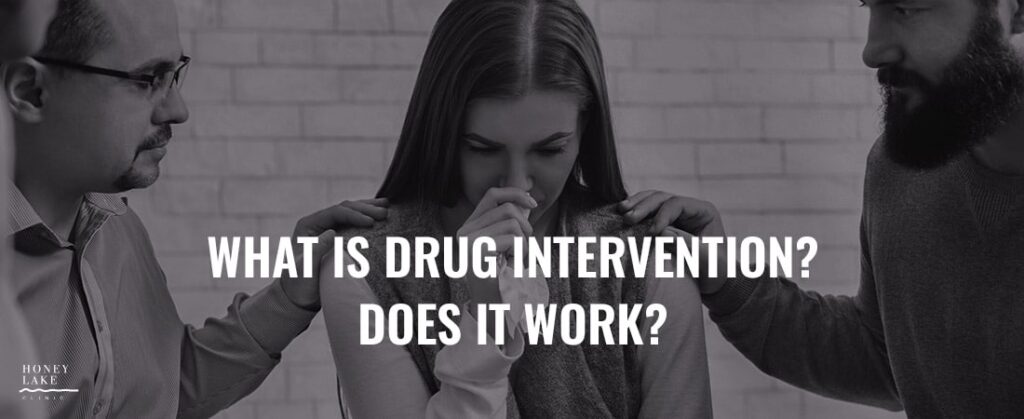What is Drug Intervention? Does it Work?
The term intervention evokes certain images—loved ones and friends gathering in one accord to lovingly urge an addict into getting help for their substance abuse.
More often than not, by the time an intervention is planned and undertaken, it feels like a last-ditch effort.
In the best of circumstances, an intervention can serve as catalyst to get an addict to acknowledge they have a problem, and agree to seek treatment.
Interventions can also be the beginning of healing for hurting family members and friends, and excellent opportunity for a family to come together in helping their loved one towards recovery and health.
Interventions can also backfire, undermining already fragile relationships and potentially exacerbating an addict’s struggles, leaving all parties involved deeper in despair. Whether an intervention will help in your unique circumstances depends on many variables.
There is really no way to predict the outcome.
What Is an Intervention?
An intervention seeks to leverage a united front in encouraging someone with a substance abuse disorder or addiction to admit to his or her problem and seek appropriate help.
During the intervention, a group of family and friends gather together to confront the addict.
Often an intervention is staged as a surprise, the addict unaware of the plan.
Those gathered may take turns sharing the impact of the addiction and the addict’s behavior is having in their life and relationship. Rather than speaking in generalities, participants speak very specifically and personally of their pain, their fears, and their resolve to act.
Participants may share decisions they’ve made, consequences for the addict refusing to admit his or her problem and seek help.
The goal is to make seeking treatment seem like the obvious, easiest, and most rewarding choice.
As you can imagine, intervention can be very emotional and even become quite animated.
It’s no wonder interventions are now the subject of reality television shows—audiences tuning in to see others’ pain and anguish.
Do Interventions Work?
Little reliable research is available on the effectiveness of interventions.
Effectiveness is difficult to define. An addict may be more likely to get help when they’ve been confronted with an intervention, but interventions don’t affect the outcome of treatment itself.
If an addict seeks a depression center without being fully committed to a life of sobriety—as some might do in response to the overwhelming pressure of an intervention—he or she may actually be less likely to get better.
Risks of Interventions
In and of themselves, interventions in don’t pose serious health or psychological risks. They won’t make the abuse or the addiction worse. What is at risk is a deeper rupture in relationships—some may respond to the intervention with anger, essentially daring you to stick to and follow through with your threats.
Intervention in Theory and Practice
One way to ensure an intervention is as effective as possible is to have a certified mental health professional or interventionist help guide the process, planning to fruition.
A professional is able to provide practical guidance as well as help defuse tension. Advanced planning and following through with your plan offer the best chance of success.
If you’re planning an intervention, here are some practical considerations which can help:
1) Time – Don’t schedule an intervention for a time that the addict is likely to be high or stressed. If the addict is otherwise distracted or overwhelmed, he or she will have trouble listening.
2) Tone – Don’t yell at or shame the addict. An intervention is not the place for guilt trips. Instead, you want to help the addict see how their addiction has harmed people he or she loves. The addict should not come away feeling like a bad or shameful person. Make clear distinctions between the addict and his or her disease.
3) Tact – Keep your words short and to the point. Plan what you will say. Perhaps even write it down. Be as clear and specific as possible when addressing how the addict’s addiction has affected you. Don’t just say, “Your addiction harms our marriage.” Instead, be specific, “Your addiction has caused you to burn through our life savings and ignore our children.”
4) Target – Devise a treatment plan. Requesting someone seek treatment can be overwhelming if you don’t already have treatment lined up. Ensure that the addict’s insurance will pay for the program and that it has an opening. You’ll also want to ensure that the program fits the addict’s values. If the addict wants to look into different programs than the one you’ve chosen, offer to help find an alternative program. And follow through immediately. Don’t wait.
5) Toughness – According to experts at Honey Lake Clinic, be prepared to follow through with your consequences. If you promise to stop giving the addict money and then give money a few days later, you’re communicating that your threats are empty and your promise is meaningless. An intervention is an act of last resort, so you’ll need to ensure that you are prepared—emotionally and otherwise—to fundamentally change your relationship with the addict if needed.
If you love someone who is battling substance abuse or addiction, we know what you’re going through. An intervention can be emotionally exhausting and even terrifying, but it’s often the only thing that works to finally convince an addict to seek help. Let us help.
Our staff is standing by to answer any questions you might have about substance abuse, addiction, and treatment.
It’s important to recognize, abuse and addiction don’t happen in a vacuum. The path to recovery and wholeness involves getting to the root the problem.
To get at underlying hurt and bring lasting healing takes a holistic—spirit, mind and body—approach to addiction diagnosis, management and treatment.
At Honey Lake Clinic, our experienced doctors and staff strongly believe that faith-based treatment, encompassing spiritual, physical and mental health, will help clients and their families bring spiritual power and clearer psychological understanding to their healing and recovery.
